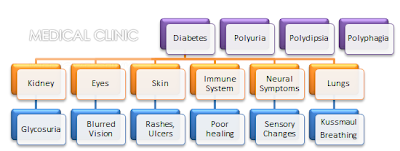We discussed in our previous post about what exactly is Diabetes? So now lets discuss what are the main signs and symptoms of Diabetes Mellitus. How does it manifest? We know it causes derangement in sugar levels of the body. Sugar, principally Glucose is the main source of energy for our body. But both increased glucose (Hyperglycemia) and decreased glucose (Hypoglycemia) levels in blood are harmful to many organs. In Diabetes, lack of insulin causes hyperglycemia responsible for most of the signs and symptoms. Hypoglycemia occurs in Diabetics due to medications and inappropriate dietary habits.
Signs and Symptoms of Diabetes Mellitus :-
Polyuria, Polydispsia and Polyphagia are classical symptoms of Diabetes Mellitus.
Signs and Symptoms of Diabetes Mellitus :-
 |
Signs and Symptoms of Diabetes Mellitus
|
- Frequent urination :- Water retention is an important function of Kidney. Water retention is co-related with the absorption of glucose and sodium. In Diabetes there is excess Glucose excretion in urine, condition termed as Glycosuria. Hence there is also excess excretion of water, resulting in increased urine output known as Polyuria.
- Increased thirst :- Naturally as there is increased water loss, there is increased requirement for water consumption to avoid dehydration. It is known as Polydipsia.
- Extreme hunger :- Insulin redistributes glucose from blood to the tissues. Hence in Diabetes there is decreased availability of glucose to cells and tissues as most of the glucose is present in blood. Other neural mechanisms are responsible for hunger. This increased appetite is known as Polyphagia.
Polyuria, Polydispsia and Polyphagia are classical symptoms of Diabetes Mellitus.
Other signs and symptoms are as follows :-
- Blurred or distorted vision - Sudden change in vision
- Infections - Frequent acute infections occur. These may precipitate complications.
- Skin changes - Skin becomes dry or waxy. Variety of skin rashes & ulcers occur in diabetics.
- Poor wound healing - Frustrating pace of healing causes significant morbidity.
- Sensory changes - Decreased sensation or feeling of numbness or tingling may occur in hands & feet.
- Improper Breathing - Kussmaul's Breathing (seen in complications of diabetes).
- Weight changes - Type I patients experience weight loss while type II patients are obese.
Other non specific symptoms like lethargy, gastric symptoms like nausea, vomiting etc may also occur sometimes. Most diabetics also have co-existing entities like Hypertension, Thyroid Disorders etc.
It is important to note that many diabetics (especially type II patients) have prolonged symptom free periods as we said before. Symptom free periods correlate with good control over blood glucose level and proper diet. Hence these two things form an important part of therapy.
In subsequent posts we will discuss more about diagnosis (criteria for diagnosis), treatment and complications of Diabetes. Stay tuned for in depth information about Diabetes. Tell us what you would like to know more Diabetes. Share it with your friends and family and send us your responses and queries through comments or via email.
Comments
Post a Comment
All Comments are subject to moderation.